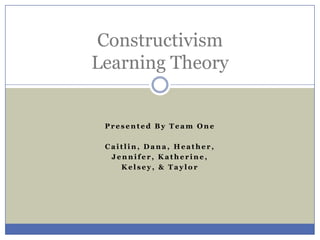
Constructivism
- 1. Constructivism Learning Theory Presented By Team One Caitlin, Dana, Heather, Jennifer, Katherine, Kelsey, & Taylor
- 2. Key Points to Constructivism: Students learn through their own experiences Teachers guide/steer students in the right direction Students use critical-thinking skills “I hear and I forget. I see and I remember. I do and I understand” – Confucius
- 3. Key Contributors to Constructivism John Dewey Lev Vygotsky 1859-1952 1896-1934 Jean Piaget Jerome Bruner 1896-1980 1915-present
- 4. Jean Piaget Gave insight into the role of maturation in children’s increasing understanding Proposed that at certain key ages, children’s thinking moves into totally new areas. Developed a concept that placed children into one of four categories: Sensorimotor Birth-2 yrs Preoperational 2-7 yrs Concrete Operational 7-11 Formal Operational 11 and up Two of the most well-known areas of Piaget’s work relating to learning theories are assimilation and accommodation. Assimilation: the incorporation of new information into the mind without “changing the structure of the internal world” Accommodation: adjusting the ideas held in your mind to fit the world around you Today there is growing evidence that Piaget’s four stages, which assume that no matter how smart a child is, he cannot understand things a certain way, are too rigidly structured and at least partially incorrect.
- 5. John Dewey Known as the Father of Progressivism or Father of American Education Believed students should master the scientific method and use it to face the world around them (1) Become aware of the problem (2) define it (3) propose various hypothesis to solve it (4) examine the consequences of each hypothesis in the light of the previous experience (5) test the most likely solution Encouraged educators to use creative methods to teach their students in ways that would combine concrete and practical relevance to the students’ life His outlook was highly debated. Some saw him as a Hero Eight-Year Study was conducted to see which educational approach was more effective Found that graduates of progressive schools 1. Earned a slightly higher grade point average 2. Earned higher grades in all fields except foreign language 3. Tended to specialize in the same fields as more traditional students 4. Received slightly more academic honors 5. Were judged to be more objective and more precise thinkers 6. Were judged to possess higher intellectual curiosity and greater drive Some felt he was destroying U.S. schools with claims that his curriculum was not academically sound Started the University Elementary School or Laboratory School with Student-directed with a teacher serving as a guide for resources
- 6. Jerome Bruner Bruner felt that the teacher’ role should be to encourage students through exploration and inquiry. Proposed that learning is an active process in which the learner constricts new ideas or concepts based on his current or past knowledge. Believes that constructivist learners are participatory learners who are actively engaged in the learning process. His constructivist theory provides a framework for instruction based on the study of cognition. The theory of cognition suggests that students pass through different intellectual stages. Curriculum should be organized in a spiral manner so students continually build upon what they already have learned called Spiral Curriculum. Believed teachers should provide activities to guide students, and create opportunities for discussion or for using the Socratic method of learning. Socratic method- when students learn how to analyze problems, to think critically about their own point of view and thee view of others, and how to articulate and defend their position.
- 7. Lev Vygotsky Russian educational psychologist Developed what is known as Social Cognition Believed that learning was influenced by social development Proposed that children have a Zone of Proximal Development The difference between the problem-solving ability that a child has learned and the potential that the child can achieve from collaboration with a more advanced person He theorized that Collaborative Learning, or learning concepts with an adult or advanced child would give a better understanding of the material He also proposed Scaffolding which is altering schemata to build learning experiences from each students level of development
- 8. Implications of Constructivism For Students For Teachers the students accomplish learning the teacher is a facilitator of more independently the students become highly learning motivated to learn the teacher is the guide for the the students have the responsibility students to use technology to learn the students have the opportunity to the teacher encourages the explore internet and technological students to think for themselves possibilities the students are not as limited on the teacher is responsible for how they use technology to learn being aware of available the students are held responsible for technology improper use of technology and the internet the teachers educate students on internet and computer safety
- 9. In Conclusion: We all agree that if used responsibly, constructivism can be a very useful learning theory for creating motivated learners. In fact many of us wish that we had more teachers who followed this learning theory. By allowing the children the opportunity to learn through their own experiences while you the teacher are guiding them, you are giving them a tool they can use throughout their lifetime. “Give a man a fish and you feed him for a day. Teach a man to fish and you feed him for a lifetime.” Chinese Proverb
- 10. Credits Information for presentation from: •Integrating Technology and Digital Media in the Classroom (Sixth Edition) http://www.learningandteaching.info/learning/piaget.htm http://www.learningandteaching.info/learning/assimacc.htm Illustrations: http://piagetpedagogia2010.blogspot.com http://caritoandjoha.wordpress.com/2011/06/01/principales-autores http://cvbwebquest.wordpress.com/lev-vygotsky http://rollins.edu/125/pointsofpride/5.html